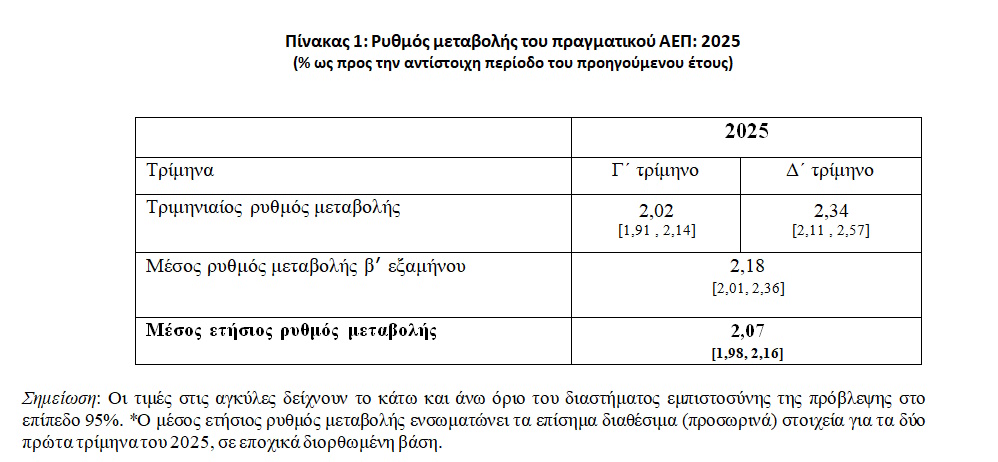The assessment that the Greek economy It remains stable in a growth trajectory, with the average rate of change in gross domestic product (GDP) for 2025 at 2.1%, today (30.9.2025) according to the updated forecasts of the Model of the Factors The Center for Planning and Economic Research (KEPE).
This assessment constitutes a slight revision of the corresponding prior provision of the KEPE (2.2%), as it reflects the mild deceleration recorded by the growth rate of the Greek economy in the second quarter of the year.
The consistently positive prospect of the development of the Greek economy is reinforced by the indications for increased potential of tourism and construction sectors, by the forthcoming application of institutionalized and announced policy measures that will help enhance the available income of households, from the expectations of the Public Investment Program, It is funded by the recovery fund, as well as by the improved economic conditions in the EU and the most stable climate formed by the EU and US agreement on duties.
On the other hand, the risks and uncertainties that arise in the present context from the external environment and geopolitical developments remain serious, stressing the need to boost the resilience of the Greek economy through reforms and investment to strengthen its productive base.
Detailed presentation of KEPE forecasts
Based on the latest temporary data on quarterly national accounts, the Greek economy remains stable on an upward trajectory, with the actual rate of change in GDP slightly receding in the second quarter of this year, to 1.7% annually, from 2.2% in the first quarter.
The mild deceleration of growth rate in the second trimester does not appear to be an indication of a systematic change in the dynamics of the Greek economy, as it primarily derives from individual short -term changes, the effects of which have offset one another.
Indicatively, a significant positive effect on the growth rate resulted from a sharp decline presented in the second quarter of imports of goods and in particular fuel imports. At the same time, in the retention of the growth rate during the same period, the observed intense reversal of the course of stocks, the prolonged rapid accumulation of which had worked for the rate of change in GDP in the same period, contributed to the previous quarters.

In the above framework, the table presents the up -to -date Economist Estimates of the KEPE for the rate of change in Greece’s real GDP in 2025, based on the model of the CPCs and by integrating the data for the second quarter of the year.
According to these estimates, the average annual rate of change of real GDP for 2025 is projected to 2.1%, an estimate which constitutes a slight revision of the corresponding prior provision of the KEPE (2.2%). This assessment reflects the aforementioned mild retreat of the growth rate of the Greek economy in the second trimester, along with the favorable evolution of the majority of variables taken into account.
More specifically, for the second quarter of 2025, the quarterly data of national accounts at constant prices, compared to the corresponding quarter of 2024, depict a significant increase in private consumption, as well as a restrained recovery of the general government’s spending. In addition, the firm capital investments have returned on the upward trend, mainly lever, the revitalization of investment expenditure in the categories of construction and transport equipment.
Outdoor, positive developments in the activity of the tourism sector have led to a significant increase in exports, while a negative sign formed the rate of change of export goods, a development reflecting a decline in fuel trade.
Concerning the course of indicators reflecting the activity of basic sectors of the economy, developments in the second quarter of 2025 compared to the corresponding quarter of the previous year were primarily positive. Initially, it was important the rise observed in travel receipts and the production index in construction, referring to enhanced dynamic and positive prospects for the course of these branches over the rest of the year.
In the field of trade, the general index of retail volume increased, while in the industry sector, although the development of general indicators related to industrial production and turnover in industry was negatively affected by the significant decline in energy sector, sales in the rest of the industry.
Regarding the course of the domestic labor market, there was further improvement of conditions, increasing the number of employees and a decrease in the number of unemployed compared to the first quarter of the previous year.
As for the second quarter of 2025 for prices, developments indicate energy costs and fluctuations in average inflation, with maintaining significant inflationary pressures on basic categories of goods and services such as housing, clothing-footing and hotels. Regarding the performance of the ten -year Greek bond, which is related to the levels of uncertainty in the economy, a marginal decline was observed compared to the first trimester of 2025, and a corresponding small retreat of the spread against the corresponding German bond. Regarding the indicators that reflect the expectations and estimates of the economic economic activity, developments in the second quarter of 2025, compared to the first quarter of the year, showed the strengthening of business expectations in Greece in the fields of industry and construction.
The consistently positive prospect of the development of the Greek economy based on the image of the second quarter of 2025 is reinforced by the indications of increased dynamics of tourism and construction sectors, by the forthcoming application of institutionalized and announced policy measures that will contribute to the enhancement of the disposable income of the of the Public Investment Program, including the bonus funded by the recovery fund, as well as by the improved economic conditions in the EU and the most stable climate formed by the EU and US Agreement on duties.
On the other hand, the risks and uncertainties that arise in the present context from the external environment and geopolitical developments remain serious, stressing the need to boost the resilience of the Greek economy through reforms and investment to strengthen its productive base.
